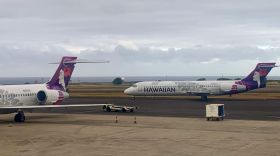The state has more than $400 million in unspent federal funds for a program to help low-income families.
Temporary Assistance for Needy Families, or TANF, is a federal block grant given to states to help low-income families meet their basic needs.
Funds are commonly distributed as direct cash assistance to eligible families for up to five years, and can also be used for work assistance, after-school programs and pre-K.
The state receives about $99 million a year, but it currently has over $400 million in unspent TANF funds. Hawaiʻi has the fourth-largest reserve of TANF funds in the country.
“One of the big problems is that when you compare Hawaiʻi's unobligated balance to the amount of money that the feds give us in a year, we are hoarding 4.5 years' worth of federal monies,” said Tax Foundation of Hawaii President Tom Yamachika. “It’s not even close to what other states do.”
TANF funds do not lapse, so they can be carried over year to year, which is one of the reasons Hawaiʻi’s reserve is so high.
However, the state Department of Human Services said that recent federal law changes have removed some of the barriers to spending the fund.
For decades, residents from the Pacific nations part of the Compact of Free Association, or COFA, were not allowed to access federal benefits. Residents from Palau, the Marshall Islands, and the Federated States of Micronesia are part of COFA — treaties with the U.S. that allow residents to migrate visa-free to the U.S. in exchange for using their land for military positioning in the Pacific.
However, the state constitution requires that benefits go to all eligible residents equally. Benefit, Employment and Support Services Division Administrator Scott Morishige explained that ensuring coverage for COFA residents made expanding the program difficult.
“Anytime we considered a potential use of funds from the TANF reserve, we needed to look at setting aside a comparable amount of general funds, non-federal funds, to be able to provide equivalent services to that population,” he said.
But last year, Congress passed a law to restore federal benefits to COFA residents. Since the law went into effect, Morishige said the department was able to increase the TANF benefit to families. That means a family of four would see an increase of about $250 a month to their TANF benefit, bringing it to about $1,200.
DHS is also using TANF funding to support after-school programs, and exploring ways it could be used for housing support programs.
Morishige explained that a positive to having such a large reserve is that the funds can be used in emergencies, like to support Maui residents after the 2023 fires with housing assistance, car payments and more.
So far, DHS has spent about $15 million through TANF to assist 2,500 Maui families. And another emergency is looming: cuts to federal assistance like the Supplemental Nutrition Assistance Program, formerly known as food stamps.
“It wasn't purposeful to let that much accumulate, but it is rather convenient right now that we're heading into some reductions in our federal programs to have a little more to give,” said state House Human Services and Homelessness Committee Chair Rep. Lisa Marten.
She said that while TANF cannot be used to directly subsidize someone who has lost SNAP benefits, funds can be used in different programs to alleviate financial stress in other areas that qualify.
“Just having more programs will allow people to move their resources around and hopefully be better off,” Marten said.
DHS is working on understanding how recent announcements from the U.S. Department of Agriculture will impact SNAP benefits.
Hawaiʻi Public Radio exists to serve all of Hawai’i, and it’s the people of Hawai’i who keep us independent and strong. Help keep us strong to serve you in the future. Donate today.







